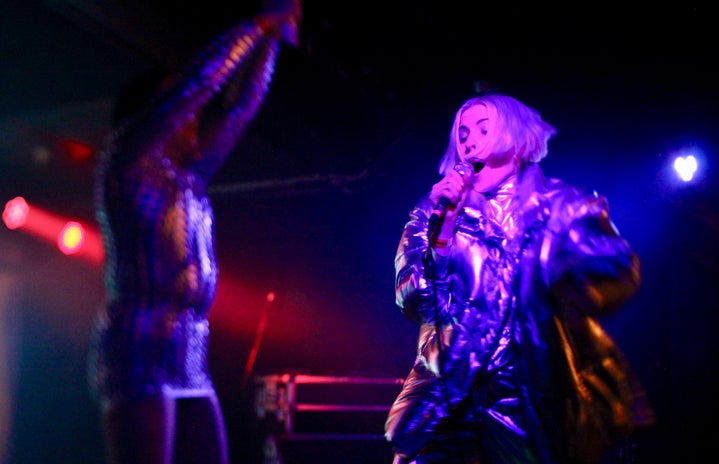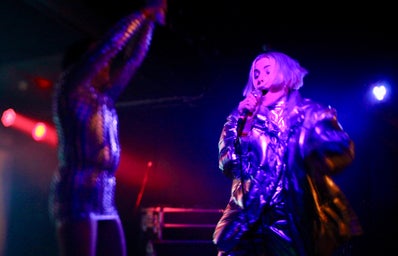Hyperpop is one of the greatest things I’ve come across since the start of the pandemic. What started as a casual daily Spotify listening session ended up sucking me into the wonderfully glitched-up, black hole trip that is hyperpop.
Auto-tuned and glitchy vocals, unexpected randomized effects, machinery-reminiscent sounds, and heavy distortion all contribute to a notably disruptive genre that is not only growing, but changing the way pop music is both created and listened to.
While hyperpop is a trend in today’s internet-obsessed culture, its roots can be traced to the creation of the record label PC Music, founded by English producer A. G. Cook. The collective playfully propelled the idea that electronic music could be created by anyone with a laptop, establishing hyperpop as a recognizable style. The collective’s work was influenced by late 90’s and early 2000’s dance music, as well as the hip-hop, trance, J-pop, 8-bit, vocaloid, dubstep and nu metal genres. SOPHIE, considered by many as the pioneer of hyperpop, worked closely with PC Music and became widely known for her particular style of sculpting surrealist sounds through pop music, before her untimely death last year.
Despite hyperpop’s initial record label origins, the sub-genre evolved into a niche internet community of SoundCloud artists, most notably 100 Gecs. With the release of their 2019 single money machine, the duo garnered over 40 million streams in Spotify as well as a cult online following. Their ultra-futuristic and processed sound, drenched in meme and videogame culture, is not your typical listening experience. Instead, it’s a collection of oddly misplaced sounds with virtually no structure that challenges commercial conventions in mainstream pop. In the world of hyperpop, music is synonymous with experimentation: the boundaries of pop are pushed to the extreme. As SOPHIE described in a 2015 interview for Rolling Stone, creation then becomes a challenge of using “current technology, current images and people, to make the brightest, most intense, engaging thing”. This is precisely what makes the subgenre so different yet exciting: the entire process is experimental.
For instance, and in her album KiCk i, Venezuelan artist Arca fuses industrial music with operatic vocals and reggaetón combined with cyberpunk aesthetics. Crossing boundaries between languages, genres and gender identity, Arca’s work demonstrates the transgressive spirit that dominates hyperpop. What makes it unique from other genres is that there is no specific “correct” sound of hyperpop. For rising artist glaive, “hyperpop is just a huge variety of music and people put under a single belt.” Therefore, hyperpop is best understood as a movement, not a box full of stylistic constraints.
At the forefront of hyperpop is also a sense of community, where artists experiment and often collaborate virtually. More importantly, it’s also an important sphere within queer culture. As the mainstream is still dominated by cis female and male perspectives, hyperpop became a creative platform for trans and nonbinary artists. Questions of queer experiences are both explored and highlighted in the music of artists like Dorian Electra, Arca, SOPHIE, Kim Petras, 100 gecs’ Laura Les and many others.
Hyperpop became known through the internet thanks to SoundCloud, TikTok and eventually, Spotify’s own hyperpop playlist, garnering a notable Gen-Z audience. However, hyperpop culture reminisces on the older, digital Y2K era aesthetics. As reporter Günseli Yalcinkaya describes in her 2021 article for Dazed: “Blurring the divide between body and machine, artist and song names are styled in lower-case lettering, reminiscent of online messaging boards, while visuals are littered with cheap-looking 3D renders, evoking the bygone era of Myspace and Windows 95. Even the vocals, often processed to cyborgian proportions, intentionally embody error, with an emphasis on digital stutters or glitches”.
Through everything it embodies, and as relatively small a subculture it may be, hyperpop is changing the musical game. Whether embraced by more established names like Grimes, Rina Sawayama, and as of recently, Charli XCX, or rising artists such as ElyOtto, Quay Dash and glaive, hyperpop is here to stay.


